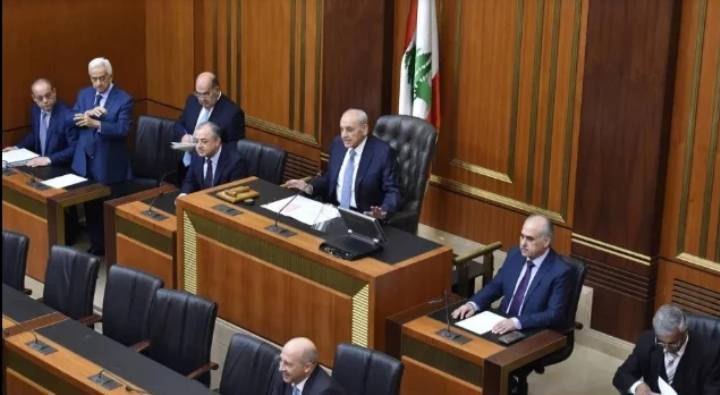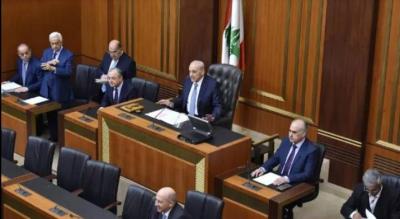The presidential election remains postponed and obstructed, due to a lack of internal and external consensus. According to informed political sources, "the story is far off." There have been no practical results from the Paris meeting, given the lack of agreement between the French and Saudis regarding how to deal with "Hezbollah." Likewise, internally, some believe that Christian consensus is a prerequisite for electing a president, but this consensus seems nearly impossible so far, and the holding of the Christian meeting in Bkerke is yet to be decided, regardless of its form and mechanism.
In light of this closed reality regarding presidential solutions, the Parliament Speaker will not call for an electoral session and "will not go to the council unless a president is elected," according to sources close to his position. These sources state, "Every time an electoral session is held, it is portrayed as a farce. This is true, but it is not the responsibility of Speaker Berri; it is all Lebanese responsibility. So why don't they come to Parliament with serious nominations? Then we won't leave the council until we elect a president. When this process is ready, Berri will not delay the election session by a single minute."
While Berri does not call for electoral sessions, the "Shia duo" blocks vote with white papers and both Berri and "Hezbollah" insist on the nomination of the head of the "Mard" movement, Sleiman Franjieh, despite the largest two Christian parliamentary blocs rejecting his election. However, sources close to the "duo" consider that voting with a white paper is a constitutional right, and that electing Franjieh or anyone else with less than 65 votes changes nothing in the presidential equation and does not result in electing a president. They see that the problem isn't that "we are clinging to Franjieh," but rather the absence of dialogue, consensus, and the declaration of genuine serious nominations.
Therefore, Berri continues to communicate with all parliamentary blocs without exception. He proposed "to go to the council with serious candidates, and there may be two or three prominent candidates on the scene now... let one of them be elected." Berri urges parliamentary blocs, especially the Christian ones, to "agree on serious nominations, and then let the sessions be open." Berri believes this mechanism will lead to electing a president; parliamentary blocs will make efforts to convince other blocs to vote for their candidate, and if each candidate in the first session receives 30, 40, or 50 votes, the equation will change in subsequent sessions, thus leading to pouring votes for one candidate over another, ultimately electing a president.
Those close to Berri confirm that no party is "sticking to their candidate," and even the candidates themselves, both announced and unannounced, are not adamant about their nominations if they are certain they have no chance of being elected. However, despite Berri being "not attached to anyone if the country is gone," there is still no decision made to support or elect anyone other than Franjieh.
Political sources explain Berri's position by stating that the presidential issue has not yet matured, and "we are still revolving in the same loop." Even the initiative from "Progressive Socialist Party" leader Walid Jumblatt has not broken the deadlock because there is still no agreement on a name. These sources believe that Jumblatt has not yet made his final presidential decision and will decide when he sees a serious nomination on the "table." Similarly, the election of the Army Commander, the most prominent unofficial candidate, is not in Berri's hands due to a lack of external consensus on his name, in addition to not securing the necessary quorum for his election, and a lack of Christian agreement on his name, as "Free Patriotic Movement" head, MP Gebran Bassil, refuses to vote for him and will not secure the quorum for the session, while the head of the "Lebanese Forces" believes that electing the Army Commander requires a constitutional amendment, which is not feasible.
In this reality, the "Shia duo" still relies on achieving broader parliamentary support for Franjieh, as in politics, "there is no wall we cannot pass through, but we can open a door in it." The previous presidential experience of electing General Michel Aoun as president, after he received support thought to be impossible from Geagea and former Prime Minister Saad Hariri, fosters hope among Franjieh's supporters for his election. Berri remains adamant that dialogue and consensus among Lebanese is the closest path to the presidency.
He believes that his presidential proposal aligns with Bkerke's proposal, whereby each Christian group announces its candidate, at least the two main Christian blocs, namely "the Forces" and "the Movement." For instance, if they agree to go to Parliament with the three candidates: Franjieh, Bassil, and the Army Commander, then "welcome to whoever is elected."




